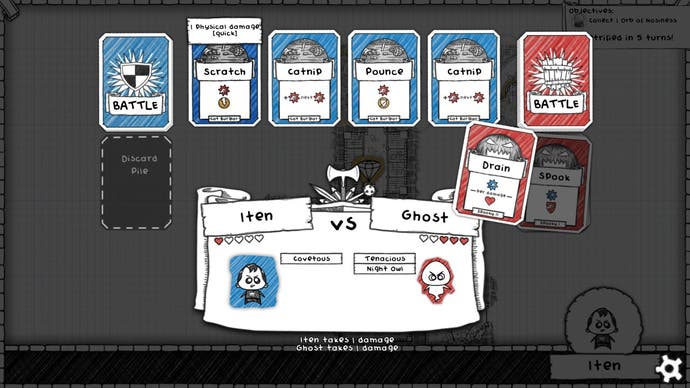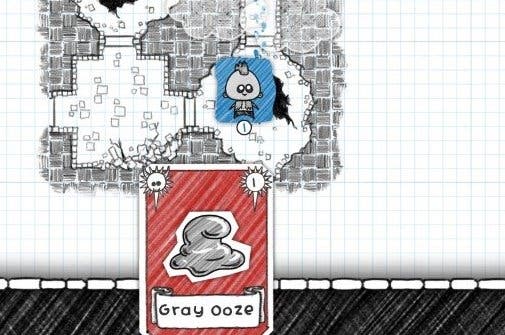Guild of Dungeoneering: an RPG where you play as the difficulty curve
Sketchy.
The classes in Guild of Dungeoneering are pretty weird: there's the Cat Burglar, for example, who talks about lobbing kitties at her foes, and there's the Shapeshifter, who longs to be able to transform into a bag of silver coins. But far weirder is the role that the player is truly lumbered with for much of the adventure. I've been playing Guild of Dungeoneering on and off for a week, and I've only recently spotted it: this is an RPG where you play as the game balancing.
It's a touch more confusing than that. In combat, sure, it's all pretty traditional stuff. When your dungeoneer encounters a monster, it's card-battling time, your deck against their deck. It's pleasantly busy, with each class having their own particular tricks to play in battle, and a range of complicating factors to think about. Alongside physical attacks, for example, you can land magic attacks. Then there are blocks for both physical and magical attacks, lightning strikes, and unblockable moves. This is still just the most basic layer of the fun. Pretty soon, you're juggling cards that allow you to regain health if your attack is successful, and you're stopping off at fountains that may allow you to see your enemy's hand or limit you to a certain number of cards. Throughout all of this, though, the focus on tempo remains central to proceedings: if you can't do any damage yourself, you should at least be encouraging your foe to waste their turn too.
Beyond the battling, though, Guild of Dungeoneering is a much stranger beast. Outside of fights, you relinquish direct control of your dungeoneer. Instead, you play as the dungeon, choosing from the cards you're regularly dealt to lay down rooms, and then populating them with monsters and filling them with loot. Each dungeon is a one-shot affair, generally with a gimmick, such as a boss you will have to defeat after a turn counter has ticked down, or a tile you have to reach, and it's your job to tempt your dungeoneer in the right direction in both the way you build your dungeon and the treats you throw into its chambers.
Crucially, you're generally trying to get your dungeoneer ready for the big battle that lies ahead too, and that means levelling them up by throwing in a monster that they can already handle in a fight, and then throwing in one that's a bit more dangerous, and then a bit more dangerous, and then... Levelling is a quick business, and each fight will probably see you picking up a new trinket to fill one of four item slots, allowing you to pick between the range of new offensive cards offered by a sword, say, or the extra health point granted by a piece of body armour. All XP is wiped when the dungeon is finished, and the next time around you get to do it all over again. The only constant is the gold you collect along the way.

This gold is spent back at the guild, and this is perhaps the game's weak point. You can spend your loot on new rooms for your base, some of which give you new character classes, and some of which grant new basic cards or even amulets that you can take into battle, feathering your classes in different directions. It's clever, but it also makes the game rather grindy - up until the point that you realise the game's character balancing - somewhat ironically given the theme - is all over the place, and you can hack through most of the surprisingly lengthy adventure unlocking just three class types.
This grindiness, and an inevitable sense of repetition that sets in, is largely offset by a lovely Biro-and-paper artstyle that invokes the kind of rough-and-ready RPGs that were played in the back of an exercise book during maths class, and by that central concept that sees you leading an adventurer not so much through a dungeon as through the upwards trajectory of becoming a hero. Many RPGs allow you to balance the levelling curve in some way, of course, even if it just comes down to fleeing a pack of goblins you aren't ready to cut to pieces just yet, but Guild of Dungeoneering takes it all one step further, mingling the lineage of Hero Quest, say, with something that feels like Katamari Damacy. This is a knockabout tale of escalation, endlessly retold.

